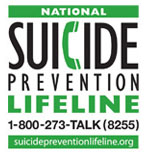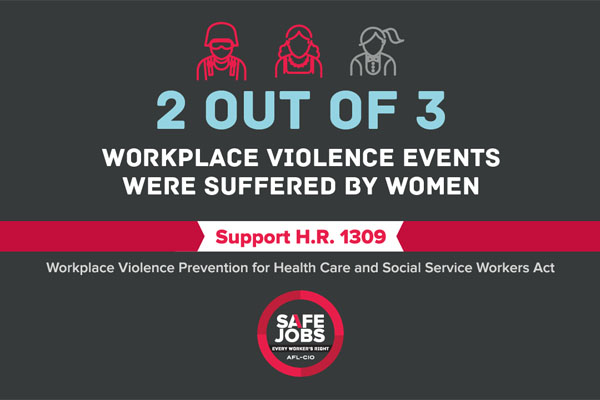OPINION
End the silence, stigma on mental health
Unions are working to remove barriers to treatment, and to protect healthcare workers who provide those critical services.
By APRIL SIMS
(May 31, 2019) — May has been Mental Health Awareness month, which we’ve observed in the United States since 1949. Mental Health America started this month of observance in an effort to encourage discussions about mental health in the US. Seventy years from its inception, we’ve made significant strides in how we respond to mental illness, but work still remains.
 While health care has long been a focal point at the bargaining table, it has increasingly become one of the focuses in our legislative and political work, with recent advocacy supporting Medicare for All. Despite this focus, mental health can sometimes be an afterthought in our healthcare conversations individually and systemically. Even when mental health care is a priority in legislation, or included in worker benefits, there are still significant barriers for effectively using resources.
While health care has long been a focal point at the bargaining table, it has increasingly become one of the focuses in our legislative and political work, with recent advocacy supporting Medicare for All. Despite this focus, mental health can sometimes be an afterthought in our healthcare conversations individually and systemically. Even when mental health care is a priority in legislation, or included in worker benefits, there are still significant barriers for effectively using resources.
In the case of employee benefits, this is partly because significant stigma still persists around mental health treatment, and misinformation about how mental health struggles impact folks is everywhere. Persistent stereotypes about what “kind” of person requires mental health care, or harmful ideas like “it’s all in their head” create barriers to treatment. In reality, the CDC estimates that at least 50 percent of Americans are diagnosed with a mental illness or disorder in their lifetime. Mental illness is sadly common, and so many of our union brothers, sisters, and friends struggle silently, afraid of the stigma even within their own union family.
And the truth is, it’s harder for some of us to seek out care than others, even when we have access. For example, men often struggle seeking care from mental healthcare providers, which makes sense; how many times have we heard “man up” in our lives? Yet according to the CDC, overall, men are at a much greater risk for depression and suicide than women. Members of the LGBTQ community, veterans, and refugees are also at greater risk of serious mental health disorders and suicide. We see in so many ways that stigma around mental health can be deadly.
 The Suicide Prevention Lifeline number is 1-800-273-8255 or click here for more information about the services available through the Washington State Department of Health.
The Suicide Prevention Lifeline number is 1-800-273-8255 or click here for more information about the services available through the Washington State Department of Health.
When we don’t focus on mental health, there can be disastrous consequences for individuals and families. Moreover, without concentrated focus on mental health care, we harm the folks who provide this care, many of whom are part of our union family.
Mental healthcare workers face disproportionately high rates of workplace violence; according to OSHA, serious workplace violence injuries were four times more common in the healthcare sector than in any other profession. Even within the healthcare sector, mental healthcare aides and nurses are 10 times more likely to experience workplace violence than any other type of healthcare worker. Mental healthcare workers are more at risk for violent workplace injury than other type of worker.
 In addition to the violence these workers face, mental healthcare workers are consistently low paid, and the importance of their work is not reflected in state spending. Washington ranks 23rd in terms of mental healthcare spending per capita, yet Mental Health America consistently ranks Washington state in the bottom third for access to care and meeting the needs of patients. And per OSHA, the unsafe working conditions increase the cost of care; high turnover due to working conditions means that employers and the state often pay higher costs to hire and train new employees.
In addition to the violence these workers face, mental healthcare workers are consistently low paid, and the importance of their work is not reflected in state spending. Washington ranks 23rd in terms of mental healthcare spending per capita, yet Mental Health America consistently ranks Washington state in the bottom third for access to care and meeting the needs of patients. And per OSHA, the unsafe working conditions increase the cost of care; high turnover due to working conditions means that employers and the state often pay higher costs to hire and train new employees.
As union members, we are informed, engaged advocates in our own workplaces, and often in our communities as well. Throughout this country’s history, the changes union members have demanded in their own workplace have spread beyond represented workers to the whole workforce. We can take a leadership role in fighting stigma and stereotypes that harm our union family, by speaking up for ourselves or others who are dealing with mental illness, by talking about the importance of taking care of ourselves with our co-workers, and by pushing for greater mental healthcare provisions in our contracts.
On a broader scale, we need a serious and nuanced conversation around mental health care, one that connects the dangerous working conditions of those in the healthcare sector and the well-being of folks with mental health challenges.
 It’s good to see that steps are being taken as I write. Introduced in Congress in February, HR 1309, the Workplace Violence Prevention for Healthcare and Social Service Workers Act, would direct OSHA to develop a standard that requires employers in the healthcare and social service sectors to develop safety plans for their workplaces. Special shoutout to Rep. Pramila Jayapal (D-WA-7th) for being the first Washington representative to sign on to HR 1309 as a co-sponsor, and thanks to all of you who called your representatives in Congress to demand they sign-on as well; since our first post at The Stand asking for calls to legislators on the importance of HR 1309, Reps. Kim Schrier, Suzan DelBene, Adam Smith, and Rick Larsen have all signed on as co-sponsors. (Keep contacting Congress on this!)
It’s good to see that steps are being taken as I write. Introduced in Congress in February, HR 1309, the Workplace Violence Prevention for Healthcare and Social Service Workers Act, would direct OSHA to develop a standard that requires employers in the healthcare and social service sectors to develop safety plans for their workplaces. Special shoutout to Rep. Pramila Jayapal (D-WA-7th) for being the first Washington representative to sign on to HR 1309 as a co-sponsor, and thanks to all of you who called your representatives in Congress to demand they sign-on as well; since our first post at The Stand asking for calls to legislators on the importance of HR 1309, Reps. Kim Schrier, Suzan DelBene, Adam Smith, and Rick Larsen have all signed on as co-sponsors. (Keep contacting Congress on this!)
Working together, we can change the culture in our workplaces, and we can influence policy at the local, state, and federal level. So many of us know someone – or are ourselves someone – who is struggling with mental illness and with the sense of isolation that mental illness can bring. As union members, we’re rarely quiet about anything; let’s make sure our voices break through the stigma and silence harming so many of our family members, friends, and union siblings.
 April Sims is Secretary Treasurer of the Washington State Labor Council, AFL-CIO, representing the interests of more than 600 union organizations with approximately 550,000 rank-and-file members.
April Sims is Secretary Treasurer of the Washington State Labor Council, AFL-CIO, representing the interests of more than 600 union organizations with approximately 550,000 rank-and-file members.





